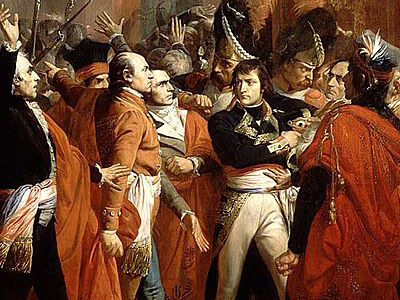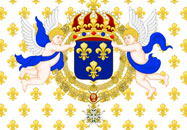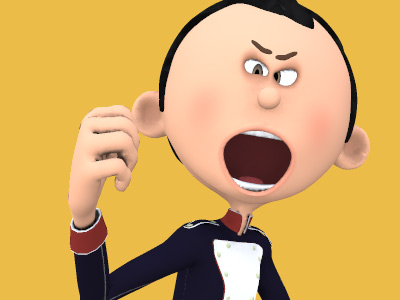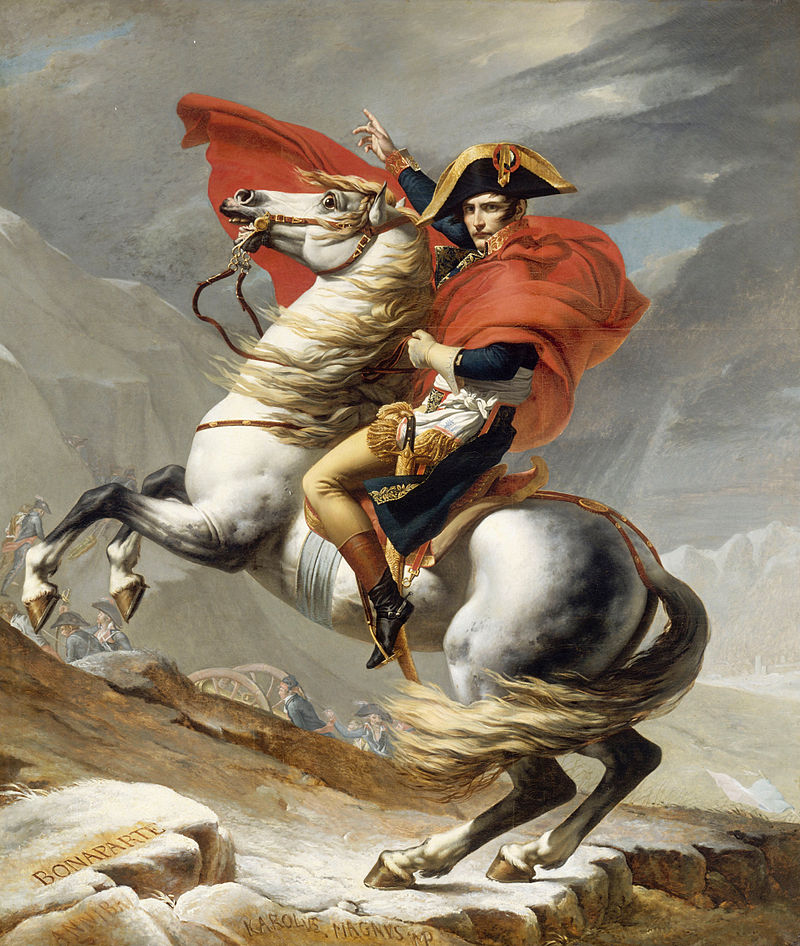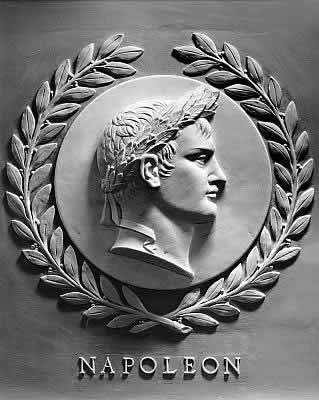Napoleon Bonaparte (1769-1821)
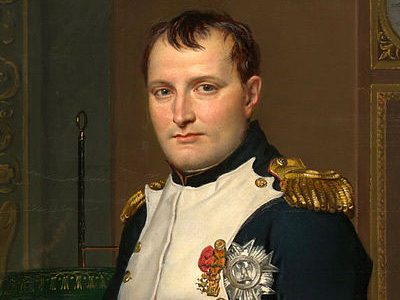
Hundred Days
Separated from his wife and son, who had returned to Austria, cut off from the allowance guaranteed to him by the Treaty of Fontainebleau, and aware of rumours he was about to be banished to a remote island in the Atlantic Ocean, Napoleon escaped from Elba, in the brig Inconstant on 26 February 1815 with 700 men over him. Two days later, he landed on the French mainland at Golfe-Juan and started heading north.
The 5th Regiment was sent to intercept him and made contact just south of Grenoble on 7 March 1815. Napoleon Napoleon Bonaparte (1769-1821), was a French military and political leader who rose to prominence during the French Revolution and led several successful campaigns during the French Revolutionary Wars. As Napoleon I, he was Emperor of the French from 1804 until 1814, and again in 1815. One of the greatest commanders in history, his wars and campaigns are studied at military schools worldwide. Napoleon Bonaparte » approached the regiment alone, dismounted his horse and, when he was within gunshot range, shouted to the soldiers, "Here I am. Kill your Emperor, if you wish." The soldiers quickly responded with, "Vive L'Empereur!" Ney, who had boasted to the restored Bourbon king, Louis XVIII, that he would bring Napoleon to Paris in an iron cage, affectionately kissed his former emperor and forgot his oath of allegiance to the Bourbon monarch. The two then marched together towards Paris with a growing army. The unpopular Louis XVIII fled to Belgium after realizing he had little political support. On 13 March, the powers at the Congress of Vienna declared Napoleon an outlaw. Four days later, Great Britain, Russia
Napoleon Bonaparte (1769-1821), was a French military and political leader who rose to prominence during the French Revolution and led several successful campaigns during the French Revolutionary Wars. As Napoleon I, he was Emperor of the French from 1804 until 1814, and again in 1815. One of the greatest commanders in history, his wars and campaigns are studied at military schools worldwide. Napoleon Bonaparte » approached the regiment alone, dismounted his horse and, when he was within gunshot range, shouted to the soldiers, "Here I am. Kill your Emperor, if you wish." The soldiers quickly responded with, "Vive L'Empereur!" Ney, who had boasted to the restored Bourbon king, Louis XVIII, that he would bring Napoleon to Paris in an iron cage, affectionately kissed his former emperor and forgot his oath of allegiance to the Bourbon monarch. The two then marched together towards Paris with a growing army. The unpopular Louis XVIII fled to Belgium after realizing he had little political support. On 13 March, the powers at the Congress of Vienna declared Napoleon an outlaw. Four days later, Great Britain, Russia Russian Empire was an empire and the final period of the Russian monarchy from 1721 to 1917, ruling across large parts of Eurasia. The rise of the Russian Empire coincided with the decline of neighbouring rival powers: the Swedish Empire, the Polish–Lithuanian Commonwealth, Qajar Iran, the Ottoman Empire, and Qing China. Russia remains the third-largest empire in history, surpassed only by the British Empire and the Mongol Empire., Austria, and Prussia each pledged to put 150,000 men into the field to end his rule.
Russian Empire was an empire and the final period of the Russian monarchy from 1721 to 1917, ruling across large parts of Eurasia. The rise of the Russian Empire coincided with the decline of neighbouring rival powers: the Swedish Empire, the Polish–Lithuanian Commonwealth, Qajar Iran, the Ottoman Empire, and Qing China. Russia remains the third-largest empire in history, surpassed only by the British Empire and the Mongol Empire., Austria, and Prussia each pledged to put 150,000 men into the field to end his rule.

Napoleon returned from Elba, by Karl Stenben, 19th century
Napoleon arrived in Paris on 20 March and governed for a period now called the Hundred Days. By the start of June the armed forces available to him had reached 200,000, and he decided to go on the offensive to attempt to drive a wedge between the oncoming British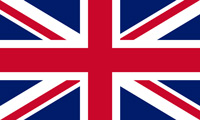 The British Empire, was composed of the dominions, colonies, protectorates, mandates, and other territories ruled or administered by the United Kingdom and its predecessor states. At its height it was the largest empire in history and, for over a century, was the foremost global power. By the start of the 20th century, Germany and the United States had begun to challenge Britain's economic lead. and Prussian
The British Empire, was composed of the dominions, colonies, protectorates, mandates, and other territories ruled or administered by the United Kingdom and its predecessor states. At its height it was the largest empire in history and, for over a century, was the foremost global power. By the start of the 20th century, Germany and the United States had begun to challenge Britain's economic lead. and Prussian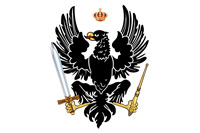 The Kingdom of Prussia was a German kingdom that constituted the state of Prussia between 1701 and 1918. It was the driving force behind the unification of Germany in 1871 and was the leading state of the German Empire until its dissolution in 1918. Although it took its name from the region called Prussia, it was based in the Margraviate of Brandenburg. Its capital was Berlin. armies. The French Army of the North crossed the frontier into the United Kingdom of the Netherlands, in modern-day Belgium.
The Kingdom of Prussia was a German kingdom that constituted the state of Prussia between 1701 and 1918. It was the driving force behind the unification of Germany in 1871 and was the leading state of the German Empire until its dissolution in 1918. Although it took its name from the region called Prussia, it was based in the Margraviate of Brandenburg. Its capital was Berlin. armies. The French Army of the North crossed the frontier into the United Kingdom of the Netherlands, in modern-day Belgium.
Napoleon's forces fought the Coalition armies, commanded by the Duke of Wellington and Gebhard Leberecht von Blücher, at the Battle of Waterloo on 18 June 1815. Wellington's army withstood repeated attacks by the French First French Empire, officially the French Republic, then the French Empire after 1809, also known as Napoleonic France, was the empire ruled by Napoleon Bonaparte, who established French hegemony over much of continental Europe at the beginning of the 19th century. It lasted from 18 May 1804 to 11 April 1814 and again briefly from 20 March 1815 to 7 July 1815. A series of wars, known collectively as the Napoleonic Wars, extended French influence to much of Western Europe and into Poland. and drove them from the field while the Prussians arrived in force and broke through Napoleon's right flank.
First French Empire, officially the French Republic, then the French Empire after 1809, also known as Napoleonic France, was the empire ruled by Napoleon Bonaparte, who established French hegemony over much of continental Europe at the beginning of the 19th century. It lasted from 18 May 1804 to 11 April 1814 and again briefly from 20 March 1815 to 7 July 1815. A series of wars, known collectively as the Napoleonic Wars, extended French influence to much of Western Europe and into Poland. and drove them from the field while the Prussians arrived in force and broke through Napoleon's right flank.
Napoleon returned to Paris and found that both the legislature and the people had turned against him. Realizing his position was untenable, he abdicated on 22 June in favour of his son. He left Paris three days later and settled at Josephine's former palace in Malmaison (on the western bank of the Seine about 17 kilometres (11 mi) west of Paris). Even as Napoleon travelled to Paris, the Coalition forces swept through France (arriving in the vicinity of Paris on 29 June), with the stated intent of restoring Louis XVIII to the French throne.
When Napoleon heard that Prussian troops had orders to capture him dead or alive, he fled to Rochefort, considering an escape to the United States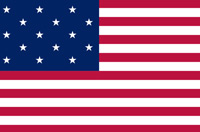 The United States of America (U.S.A. or USA), commonly known as the United States (U.S. or US) or America, is a country in North America. It is the world's third-largest country by both land and total area. The United States shares land borders with Canada to its north and with Mexico to its south. The national capital is Washington, DC, and the most populous city and financial center is New York City.. British ships were blocking every port. Napoleon demanded asylum from the British Captain Frederick Maitland on HMS Bellerophon on 15 July 1815.
The United States of America (U.S.A. or USA), commonly known as the United States (U.S. or US) or America, is a country in North America. It is the world's third-largest country by both land and total area. The United States shares land borders with Canada to its north and with Mexico to its south. The national capital is Washington, DC, and the most populous city and financial center is New York City.. British ships were blocking every port. Napoleon demanded asylum from the British Captain Frederick Maitland on HMS Bellerophon on 15 July 1815.
HISTORY
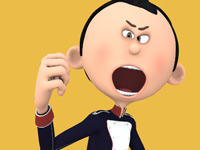
RESOURCES
This article uses material from the Wikipedia article "Napoleon", which is released under the Creative Commons Attribution-Share-Alike License 3.0.
© Stories Preschool. All Rights Reserved.
